|
|
|
Sort Order |
|
|
|
Items / Page
|
|
|
|
|
|
|
| Srl | Item |
| 1 |
ID:
161053


|
|
|
|
|
| Summary/Abstract |
The paper studies the “Turkish model” in a comparative historical perspective from three angles: as an example of mobilization modernization; as a combination of liberal democracy and Islam; and as a de-Westernization paradigm. The focus is on the transformation of the “Turkish model” and its substantive evolution from the early 1990s to the middle of the 2010s, and on how peaks of international interest in the “Turkish model” impacted Ankara’s foreign policy activities and its positioning on the international stage by Turkish elites. This approach helped to identify the factors behind periodic resurgence and transformation of the “Turkish model” and the shifting balance between the expectations of its potential recipients and Ankara’s plans to use it as a foreign-policy tool. Research methodology is based on the theory of multiple modernities and the concept of symbolic interactionism in international relations. In the case of Turkey, this approach provides broader possibilities for interpreting Ankara’s foreign-policy strategies and understanding the mechanisms of its relations with other countries in the Greater Middle East.
|
|
|
|
|
|
|
|
|
|
|
|
|
|
|
|
| 2 |
ID:
161048
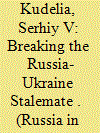

|
|
|
|
|
| Summary/Abstract |
This paper examines Russian-Ukrainian relations of the past four years in the context of the present political regime in Ukraine and the interests of its ruling elite. It focuses on the fundamental changes in the Ukrainian leadership’s foreign policy strategy and points to long-term risks associated with Kiev’s hopes that Western patronage will help strengthen its security. In conclusion, the author considers three scenarios for the development of the Ukrainian state in the coming decade and analyzes their possible consequences for Russian-Ukrainian relations.
|
|
|
|
|
|
|
|
|
|
|
|
|
|
|
|
| 3 |
ID:
161057


|
|
|
| 4 |
ID:
161056
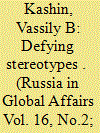

|
|
|
|
|
| Summary/Abstract |
n this article the author probes into how the Democratic People’s Republic of Korea and its political regime managed to survive in defiance of internal economic problems and external political, economic and military pressures it experienced since 1991. Comparison of the available statistics illustrating North Korea’s economic and internal political situation, as well as pressure methods and tactics used on a smaller scale against a far stronger country, the Soviet Union, during the Cold War, allows for taking a fresh look at the effectiveness of foreign policy instruments the United States created during its confrontation with the Soviet Union. Consolidation of the country’s ruling elite amid foreign pressures and exposure to external threats are identified as factors that play the decisive role in determining the outcome of the standoff. The effectiveness of pressure strategies apparently depends on this factor
|
|
|
|
|
|
|
|
|
|
|
|
|
|
|
|
| 5 |
ID:
161051
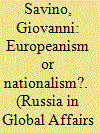

|
|
|
|
|
| Summary/Abstract |
Strange as it may seem, Ukraine could serve as a model for Europe where disintegration sentiments are growing and new approaches are needed to cope with them. But so far Ukraine has been demonstrating the opposite—readiness to repeat the mistakes Europe made before. The article explores the historical roots of reflections on nations and nationalism in the 19th century, with a focus on Giuseppe Mazzini. His view that “the nation is above all” sent an important message to radical movements in Eastern Europe in the early 20th century as a version of integral nationalism preached by Ukrainian thinker Dmitry Dontsov and the Organization of Ukrainian Nationalists. The experience of Soviet korenizatsia (indigenization) in Ukraine and the example of South Tyrolian autonomy in Italy show that the practices of nation-building and federalism produce different and often successful results. However, in the modern European Union faced with such acute conflicts as those in Catalonia and Ukraine these experiences have so far not been used for their resolution.
|
|
|
|
|
|
|
|
|
|
|
|
|
|
|
|
| 6 |
ID:
161055
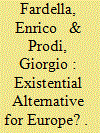

|
|
|
|
|
| Summary/Abstract |
The Belt and Road Initiative (BRI), originally aimed at domestic economic development, has turned into an umbrella bringing together China’s ambitious projects to shape a new order in Eurasia, which directly influences Europe. The authors represent both Chinese and European perspectives on this issue. The BRI has become a mechanism to represent China abroad as well as a tool to ensure China’s competitive advantage in the world trade.This also has an impact on the entire trade system redirecting trade flows and making countries to compete for investments, which alters the existing order and each country’s place in this order. Buying shares of Italian strategic national companies, gaining control over ports and terminals along the BRI sea route, for example, the port of Piraeus, and other investments recently made by China force European countries to adapt its economic strategies to new conditions.
|
|
|
|
|
|
|
|
|
|
|
|
|
|
|
|
| 7 |
ID:
161047
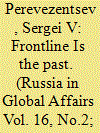

|
|
|
|
|
| Summary/Abstract |
This article studies several methods of assessing historical reality—“interpretation,” “mythologization,” “falsification,” and “folk history”—and describes all four of them. Based on this classification, the author analyzes the historical substantiation of nation-building in the modern Ukrainian state. The facts and theories used in this article convincingly prove that, unfortunately, by rejecting the data provided by Ukrainian and world science, Ukrainian politicians are building “a single Ukrainian nation” mainly by falsifying history and even using folk history. Such historical policy dramatically whips up political, ethnic, and religious tensions in the country and has negative consequences for the Ukrainian state.
|
|
|
|
|
|
|
|
|
|
|
|
|
|
|
|
| 8 |
ID:
161054
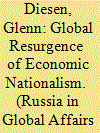

|
|
|
|
|
| Summary/Abstract |
Economic nationalism advocates state intervention in the market to create favorable symmetry in economic interdependence with other powers. All major economies have ascended to greatness with state interventions, and economic liberalism becomes a mere covert economic nationalism by hegemons. Once in control over the levers of the global economy it is in the interest of the hegemon to propagate economic liberalism to integrate other powers into asymmetrical interdependent partnerships. The Trump administration’s embrace of overt economic nationalism indicates the unravelling of the U.S. privileged geo-economic position. Relative decline is evident by a crumbling U.S. manufacturing base and narrowing superiority in innovations, the creation of alternative trade corridors outside U.S. control, and nascent rivals to the Bretton Wood institutions and the U.S. dollar. As geo-economic power shifts from the West to the East and invokes a global resurgence of economic nationalism, opportunities arise for Russia to develop more symmetry in the interdependent global economy.
|
|
|
|
|
|
|
|
|
|
|
|
|
|
|
|
| 9 |
ID:
161052


|
|
|
|
|
| Summary/Abstract |
This paper is based on the results of field research conducted by the author in Donbass in 2015-2017 and studies the media space and everyday communication in social networks and face-to-face conversations inside the self-proclaimed Donetsk People’s Republic. We studied various types of internal discourse, the use of recognizable symbols and everyday practices to see whether the new political reality matches certain social reality and whether political borders have any correlation to social borders. Political separation of this part of Ukraine and mobilization by the local political forces of local identity symbols require people to reevaluate their views concerning the community they live in and its borders associated with a certain territory, the state system, ideology, and social connections. People are developing new self-identity approaches which are tested and implemented in emerging new contexts and related discourses. This work analyzes narratives related to the new socio-political (self-)identity in the process of its evolvement and alludes to a wide range of studies focusing on identity as a category of practice, social construction of borders, inclusion/exclusion mechanisms, and collective memory.
|
|
|
|
|
|
|
|
|
|
|
|
|
|
|
|
| 10 |
ID:
161049


|
|
|
|
|
| Summary/Abstract |
One of the key issues on Russia’s current and long-term political agendas is whether Russian identity is possible without Ukraine. The purpose of this article is to study the issue through a possible transformation of the “big narrative” in Russian history. An analysis of “big narratives,” a practice established in the 1970s-80s in the continental research tradition, combines historical, philosophical, and sociological approaches. Russia’s big historical narrative is essentially imperial, which implies that Ukraine is not an indispensable constitutive element with a preset value. Therefore, in this narrative “Russianness” has no fundamental relation to the issue of Ukraine. An alternative approach towards creating a big Russian narrative as a national one suggests that it is in conflict with the Ukrainian narrative since both seek to embrace the same groups and territories. In the long term, the prevailing imperial narrative will most likely include as its essential element the interpretation of the current state as “a decline of the empire” and a “loss,” while the probability of its successful radical transformation now looks fairly low.
|
|
|
|
|
|
|
|
|
|
|
|
|
|
|
|
| 11 |
ID:
161050


|
|
|
|
|
| Summary/Abstract |
This paper presents a comparative analysis of Belarus and Ukraine with a focus on the evolution of national self-identity in both countries. It is assumed that their detachment from Russia is an inherent part of this process due to Russia’s long-term and overwhelming influence on all aspects of life in the national communities of both countries, including high and popular culture. The author points out that the forms and consequences of this detachment are not predetermined and depend on the structural peculiarities of the areas of Russian influence and on political decisions. The prevailing type of nationalism in both countries also impacts this process. Ethnic nationalism, which is widespread in Central and Eastern Europe, is more explosive and painful than civic nationalism. This analysis is not formalized and is based on field observations. The author admits that having written two monographs (Ioffe, 2008; Ioffe, 2014) and numerous articles on Belarus, he is more knowledgeable about Belarus than Ukraine.
|
|
|
|
|
|
|
|
|
|
|
|
|
|
|
|
| 12 |
ID:
161039
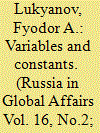

|
|
|
|
|
| Summary/Abstract |
This issue differs from the previous ones, as our readers have probably noticed. The more chaotic the international situation is and the more absurd its manifestations are, the more in-depth and stricter approach is needed in order to figure everything out.
|
|
|
|
|
|
|
|
|
|
|
|
|
|
|
|
| 13 |
ID:
161046


|
|
|
|
|
| Summary/Abstract |
This article is a study of the evolution of the Ukrainian national and political identity in the context of the most important aspects of its formation, singled out by the author. The author’s methods are based on the principle of historicism. He analyzes the formation and development of political practices and the political regime in Ukraine in the 20th-21st centuries, and compares peculiarities of the ethnic, cultural and political development of Ukraine with that of Russia and other countries in Eastern Europe. Prospects for the development of the political situation in Ukraine are discussed through the prism of the geopolitical paradigm. The author points out that during the Soviet period there were factors that worked for the separation of Ukrainians from Russians and those that worked against it. In the post-Soviet period, under the influence of growing ethnic and civic nationalism, globalism and some peculiarities of Ukrainian political culture separatist tendencies prevailed. The current conflict in Donbass has entered into a smoldering phase, which is most advantageous to the Ukrainian authorities. He describes as unlikely the possibility of major changes in the Ukrainian regime. The more probable scenario, in his opinion, is inertial.
|
|
|
|
|
|
|
|
|
|
|
|
|
|
|
|
|
|
|
|
|